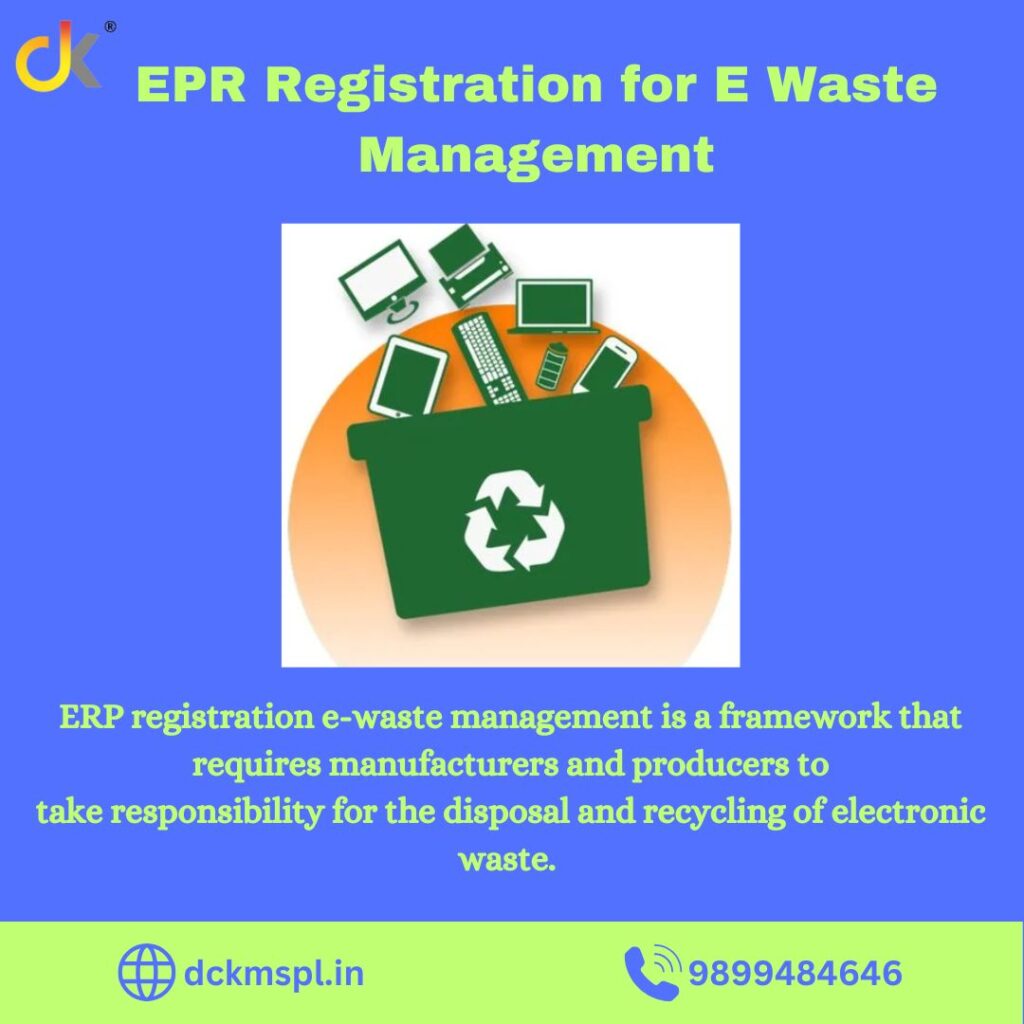Extended Producer Responsibility (EPR) is a vital framework in modern waste management, especially for managing electronic waste (e-waste). E-waste, which includes discarded electronic devices and equipment, is one of the fastest-growing waste streams globally. With rapid technological advancements and increasing consumer demand, managing this waste sustainably has become crucial. EPR registration is a regulatory requirement that ensures producers, importers, and manufacturers take responsibility for managing the lifecycle of their products, particularly after the end of their usability.This comprehensive guide explores the significance, benefits, and process of EPR registration for e-waste management, emphasizing how it contributes to a sustainable and eco-friendly environment.
What Is EPR Registration for E-Waste Management?
EPR registration E-Waste Management Rules, 2016, notified by the Ministry of Environment, Forest, and Climate Change (MoEFCC) in India. It requires producers of electronic products to ensure environmentally sound management of e-waste. The principle behind EPR is to hold producers accountable for the collection, recycling, and disposal of their end-of-life products, minimizing the environmental impact.Producers are obligated to register with the Central Pollution Control Board (CPCB) and comply with EPR regulations to avoid penalties and ensure ethical practices.
Importance of EPR Registration
- Environmental Protection
E-waste contains hazardous materials such as lead, mercury, and cadmium, which can harm the environment and human health if not handled properly. EPR ensures these materials are managed safely, reducing soil and water contamination. - Resource Recovery
Recycling e-waste allows the recovery of valuable materials like gold, silver, and copper. EPR encourages the circular economy by promoting the reuse and recycling of resources. - Regulatory Compliance
EPR registration ensures producers comply with legal standards, protecting them from fines and legal actions while enhancing their corporate reputation. - Corporate Responsibility
Companies adhering to EPR demonstrate their commitment to sustainability, which strengthens their brand image and consumer trust.
Who Needs EPR Registration?
EPR registration is mandatory for the following entities:
- Manufacturers: Companies producing electronic goods in the country.
- Importers: Entities importing electronic products for sale or use.
- Brand Owners: Businesses selling electronic products under their brand name.
- Producers: Any individual or organization responsible for introducing electronics to the market.
The Process of EPR Registration
- Understanding EPR Requirements
Producers must familiarize themselves with the E-Waste (Management) Rules and their obligations, such as e-waste collection targets, recycling responsibilities, and reporting requirements. - Developing an E-Waste Management Plan
A comprehensive plan should include strategies for collecting, storing, and recycling e-waste. Engaging with authorized e-waste recyclers is a critical step in ensuring compliance. - Application Submission
Submit the EPR registration application online via the CPCB portal. The application includes details such as:- Producer’s identity and business details.
- Categories of products manufactured or sold.
- Proposed e-waste management systems.
- Document Submission
Required documents include:- GST certificate.
- IEC certificate (for importers).
- Company incorporation certificate.
- PAN card of the organization.
- Details of the e-waste management plan.
- Approval from CPCB
After verification, CPCB grants the EPR authorization, outlining specific collection and recycling targets for the entity.
Benefits of EPR Registration
- Reduces E-Waste Pollution
By ensuring the safe disposal and recycling of hazardous materials, EPR significantly cuts down pollution levels. - Promotes Sustainable Practices
Encourages producers to design products with recyclability and durability in mind, fostering innovation in sustainable technology. - Creates Economic Opportunities
Boosts the recycling industry and generates employment opportunities in waste management sectors. - Enhances Producer Accountability
Establishes a direct link between production and waste management, compelling companies to act responsibly.
Challenges in EPR Implementation
- Awareness and Training
Many producers lack sufficient knowledge about EPR obligations and sustainable practices, leading to non-compliance. - Infrastructure Gaps
The absence of adequate recycling facilities and collection centers hampers effective e-waste management. - High Initial Costs
Establishing e-waste collection and recycling systems requires significant financial investment, which can deter smaller businesses. - Lack of Enforcement
Weak regulatory monitoring often leads to non-compliance and unchecked illegal disposal practices.
How to Overcome Challenges
- Awareness Campaigns
Educate producers about the importance of EPR and provide training on compliance measures. - Strengthening Infrastructure
Invest in setting up authorized recycling units and collection centers across urban and rural areas. - Incentivizing Compliance
Governments can offer tax benefits or subsidies to producers complying with EPR regulations. - Strict Monitoring and Penalties
Enforcing stringent penalties for non-compliance can deter illegal practices and ensure adherence to EPR rules.
The Future of E-Waste Management with EPR
The EPR framework is pivotal for addressing the e-waste crisis effectively. By holding producers accountable and promoting sustainable practices, EPR can transform the way electronic waste is managed. As technology evolves, the integration of digital tools and blockchain technology in tracking e-waste can enhance transparency and efficiency.Moreover, international collaborations and knowledge-sharing initiatives can help establish global standards for e-waste management, ensuring a unified approach to sustainability.
Conclusion
EPR registration for e-waste management is not just a regulatory necessity but a moral obligation for producers, importers, and brand owners. It ensures that electronic waste is handled responsibly, minimizing its adverse effects on the environment and human health. By embracing EPR, businesses contribute to a cleaner, greener future while enhancing their brand value and compliance standing.In the face of growing environmental challenges, EPR is a critical step toward sustainable development, making it a shared responsibility for all stakeholders in the production and consumption chain.
